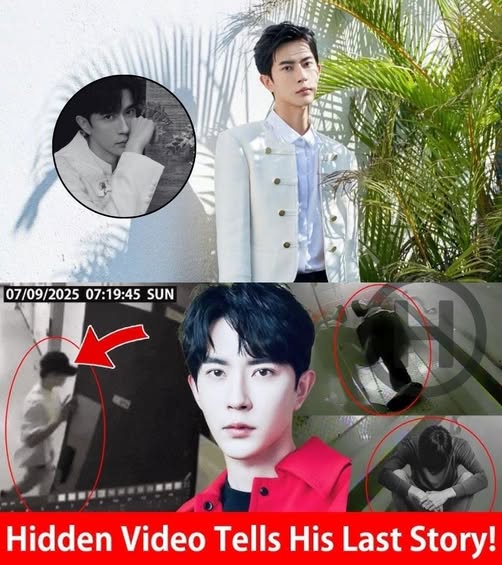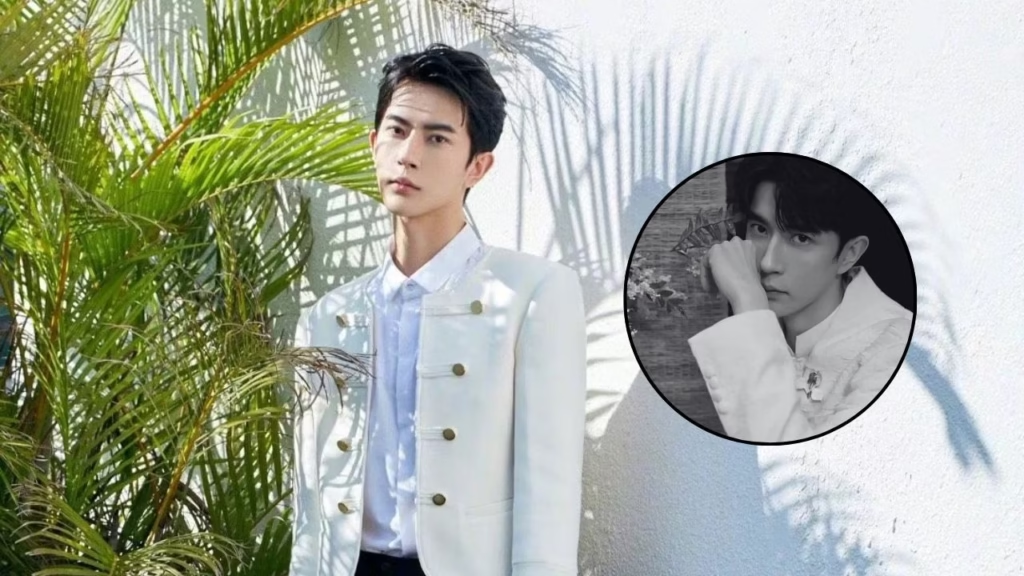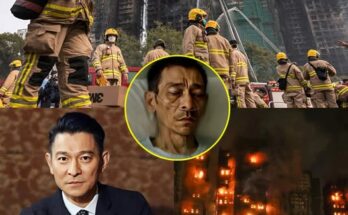
Introduction
The Chinese entertainment industry is once again shrouded in grief and disbelief. On a quiet morning in September 2025, actor and singer Yu Menglong, also known as Alan Yu, was found dead after reportedly falling from a friend’s apartment building in Beijing. He was only 37 years old.
The official verdict declared the death an accidental fall after drinking. Yet, a wave of new information—including what appears to be CCTV footage from his residence and a final message sent to his mother—has left millions of fans questioning what truly happened that night.
This is not merely the story of one man’s tragic death. It is the portrait of a broken system, a suffocating industry, and a mother’s unbearable loss.
Table of Contents
The Rise of a Gentle Star
The Night That Changed Everything
The Official Story
A Message That Shook the Internet
The CCTV Mystery
Fans Demand Answers
Industry Shadows and Silent Pressures
A Mother’s Grief and Her Plea for Peace
The Broader Meaning: Fame, Control, and Censorship
Remembering Yu Menglong

- The Rise of a Gentle Star
Born in Xinjiang in 1988, Yu Menglong began his career not as an actor, but as a musician. His early days were spent performing in small bars and uploading music videos online. His soulful eyes, soft-spoken personality, and calm determination slowly caught attention.
His breakthrough came in 2015 with the web drama Go Princess Go, a series that turned low-budget comedy into viral success. He became a household name after starring in Eternal Love, one of China’s most-watched fantasy dramas. From that point on, Yu was no longer just a singer or an actor—he was a symbol of quiet perseverance, the kind of star who made fame look graceful.
Behind the charm, however, there was also solitude. Those close to him described him as polite but introverted, someone who found it difficult to express frustration in an industry filled with noise and competition.
- The Night That Changed Everything
On the evening of September 10, 2025, Yu attended a private gathering at a friend’s apartment in Beijing. It was a small get-together: a few friends, drinks, and laughter. Nothing out of the ordinary.
According to reports, the group dispersed late at night. Yu went into a separate bedroom to rest, locking the door from the inside. Hours later, at dawn on September 11, his body was discovered outside the building.
The initial reaction from the entertainment world was disbelief. How could a man who seemed calm and collected, who had recently posted photos of his cat and upcoming projects, die so suddenly—and so violently?
The unanswered question hung in the air: Was it really an accident?
- The Official Story
Authorities quickly concluded that Yu’s death was an accidental fall caused by alcohol intoxication. Toxicology reports, according to official statements, showed traces of alcohol in his system.
His management released a short announcement confirming his passing and urged the public not to spread rumors. The police echoed the sentiment, warning against the circulation of false information online.
For some, that explanation was enough. But for many others—especially his loyal fans—the statement only raised more questions. Why were no detailed reports or CCTV clips released? Why was the funeral conducted so quickly? Why were certain online posts about him abruptly deleted?
Silence, in the digital age, often speaks louder than words.
- A Message That Shook the Internet
Days after his death, screenshots began to circulate on Chinese social media. They allegedly showed Yu’s final message to his mother.
In that message, he wrote:
“Every time I see the money they send, I feel sick. That money isn’t earned by me—it’s dirty. I must say goodbye now, Mother. They might come and kill me anytime.”
The message spread like wildfire. Though authorities never officially confirmed its authenticity, its tone, phrasing, and emotional intensity resonated too deeply to be ignored.
Was Yu warning his mother of real danger? Was he referring to the darker side of the entertainment business, to debts, blackmail, or coercion? Or was it, as officials claimed, simply the confused expression of a man under stress and alcohol?
No one could say for certain. But the words felt hauntingly final.
- The CCTV Mystery
Shortly after the message surfaced, whispers began about a CCTV recording allegedly retrieved from Yu Menglong’s residence.
Unverified posts claimed that the footage showed Yu pacing, talking on the phone, and appearing distressed hours before his death. Others insisted the footage was taken from the apartment corridor, showing someone else entering or leaving the building before the fall.
None of this footage has been publicly released, and official channels have remained silent. Yet, the mere existence of the rumor has deepened the sense of mystery.
What makes it even more troubling is that several posts discussing the alleged CCTV video were swiftly deleted. Fan groups reported their chat threads being shut down. Online discussions were restricted.
In the absence of transparency, speculation becomes its own kind of truth.
- Fans Demand Answers
Across social media platforms, Yu Menglong’s fans organized under hashtags calling for justice and transparency. Candle emojis, heartfelt tributes, and emotional messages flooded timelines. Many compared the handling of his case to other unexplained celebrity deaths in China’s entertainment history.
“I don’t believe he simply fell,” one fan wrote. “He was careful, disciplined, and had so much ahead of him.”
Some fans held online vigils, while others began small physical gatherings at landmarks where Yu had once performed. A quiet movement formed—not against any person, but against silence itself.
For them, the issue was no longer just about how Yu died. It was about why the truth felt unreachable.
- Industry Shadows and Silent Pressures
China’s entertainment industry has long been rumored to hide its share of corruption, coercion, and mental health neglect. “Hidden rules” — unspoken exchanges of favors or influence — have been whispered about for decades.
Friends of Yu, speaking anonymously, mentioned that he had faced increasing professional isolation in recent years. Certain projects were mysteriously canceled, endorsement deals withdrawn without explanation. He had confided to a close friend that he felt “trapped between staying honest and surviving.”
The emotional toll of that kind of isolation can be devastating. Stars are adored in public but often fight battles alone in private.
Was Yu’s death the tragic result of those silent pressures? The industry may never admit it, but the pattern is too familiar: bright young stars, lost too soon, leaving behind questions that no one dares to answer.
- A Mother’s Grief and Her Plea for Peace
In the aftermath, Yu’s mother stepped forward with a public statement. Her voice trembled with pain and exhaustion as she urged fans to stop speculating and to respect the family’s grief.
She confirmed that her son’s death was an accident after drinking and insisted that he had not been murdered. “He was my only child,” she said. “Please let him rest.”
Her plea should have brought peace. Instead, it divided public opinion further. Some believed she spoke the truth, others suspected she had been pressured into silence. The speculation, though painful, reflected a collective inability to accept that a man so full of life could simply vanish without explanation.
For his mother, each new rumor is another wound that never heals.
- The Broader Meaning: Fame, Control, and Censorship
Yu Menglong’s case is more than a personal tragedy—it’s a mirror reflecting how fame and truth interact in modern China.
When celebrity deaths occur under unclear circumstances, the official narrative is often swift and sanitized. Emotional posts are deleted, forums closed, and discussions labeled as “rumor spreading.”
This control creates an environment where the public, hungry for understanding, turns to unverified stories. And those stories, in turn, breed mistrust.
Yu’s death highlights the fragility of transparency in an industry where image management outweighs emotional truth. It also raises urgent questions about mental health support for artists, the need for independent investigations, and the rights of fans to know the facts about their idols.
- Remembering Yu Menglong
Beyond the rumors and theories, Yu Menglong remains what he always was: a gifted artist who gave his heart to his craft.
His portrayal of gentle, noble characters resonated with millions who saw kindness and sincerity in his eyes. His music, often introspective, revealed a man who sought beauty in a world that rarely offered it.
As fans continue to mourn, the final hope is not to expose scandal, but to preserve dignity—to ensure that his story is told honestly, without fear or censorship.
Whether or not the truth of that night is ever fully known, Yu Menglong’s legacy lives on in the hearts of those he touched. His final message, whether real or not, serves as a chilling reminder of how fragile life is beneath the weight of fame.
Conclusion
The discovery of a possible CCTV recording and Yu Menglong’s final message has opened deep wounds—not only for his family, but for an entire generation of fans who grew up watching him.
The official explanation offers closure on paper, but not in hearts. The unanswered questions—the missing footage, the deleted posts, the silence—linger like a ghost.
Perhaps one day, the full truth will come to light. Until then, what remains is the memory of a man whose quiet strength, artistry, and kindness continue to inspire. In his final moments, whether spoken or written, Yu seemed to remind the world of one simple truth: even stars can break under pressure.
And sometimes, the most heartbreaking part is not how someone dies, but how their voice fades after they’re gone.
Related Articles
“Behind the Curtain: The Silent Struggles of Chinese Celebrities”
“When Fame Turns Fatal: A Look into Industry Pressures in Asia”
“Unanswered Questions: The Thin Line Between Rumor and Reality”
“Mother’s Voices: Grieving in the Public Eye”
“The Power and the Price of Stardom”
“How Fans Are Changing the Way We Talk About Celebrity Deaths”
“Censorship and Grief: The Modern Digital Mourning”
“The Hidden Rules of Show Business: What We Don’t See”
“Mental Health and Masculinity in Asian Entertainment”
“Remembering Yu Menglong: His Legacy Beyond the Drama Screen”


